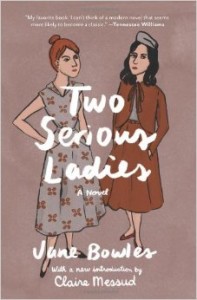In this sometimes amusing novel, two well-off American women cast aside their comfortable lives and pursue separate journeys of self-discovery. In both cases, they end up hanging out with prostitutes, con-men, and other shady characters, living in dirty places, drinking a lot, and having unconventional sexual experiences. It looks like degeneracy writ large. Yet each woman seems to find part of herself that was missing. They are not unsatisfied in the end.
It’s not a bad setup for a novel, but it didn’t work for me, for two reasons. First, the women never seemed properly motivated. They bump around from one banal experience to the next, for no reason. They seem numb and hollow. Whatever emotions they express are arbitrary rather than organic.
In this, the characters are not unlike those in The Sheltering Sky, by Paul Bowles, Jane’s husband. In that novel, the characters’ numb aimlessness seemed to be a picture of post-WWII anomie that infected much existential literature of the time, and that novel (1946, I think it was) made numerous references to the horrors of war, forming a context for understanding the characters. In Jane’s novel, the women don’t seem to stand for anything. They are just empty shells passing the time. There is no plot (which would be okay if the characters were strong).
Jane’s characters move from food and drink to sleep and sex, then back to food and drink, repeating the cycle endlessly. They are bored and unmotivated, like Hemingway’s characters in The Sun Also Rises (which was contextualized by Spanish Civil War). I wanted some explanation for why these women are so restless. There is a dim suggestion that they chafe at paternalistic society, but if that’s really the theme, it is not well-drawn.
Another drawback for me was the writing style, which struck me as vague and over-narrated. A random example:
Mr. Copperfield chuckled. “You’re so crazy,” he said to her with indulgence. He was delighted to be in the tropics at last and he was more than pleased with himself that he had managed to dissuade his wife from stopping at a ridiculously expensive hotel where they would have been surrounded by tourists. He realized that his hotel was sinister, but that was what he loved. (p.41)
That is not writing that draws me in. For example, how do you say something “with indulgence?” I haven’t a clue. How did Mr. C feel? “More than pleased with himself.” Hmm. He loves sinister hotels. Why? No reason is given in the text, and there is no description of what constitutes its sinister nature anyway. And he did not “dissuade” his wife from the other hotel. He simply decreed they’d stay at the allegedly sinister one. These may seem like nit-picky points, but the whole book is like that, and no matter how carefully I read, I rarely knew what was going on or what the narrator intended. As a result, I never felt engaged by this novel.
However, it is readable, once in a while satirical of manners and practices, and the women often have a kind of arch, Austen-like voice that’s interesting. So, not all bad by any means, but it left me unenthusiastic.
Bowles, Jane (1943). Two Serious Ladies. New York: Harper-Collins. (231 pp).


Pingback: Is Fiction Autobiography? | Can't Stop Writing...